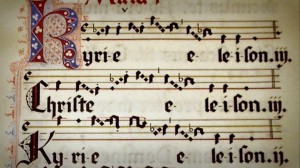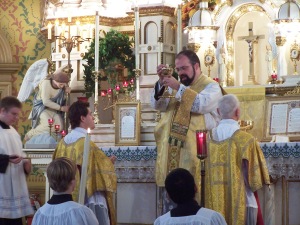I am a protestant. I grew up in Evangelical circles, went to a Pentecostal church in high school, worked at an interdenominational summer camp, and attended a Reformed university where I sang some Anglican evensongs; then I went to an Anglican church for a while after graduating. There are bits and bursts of Baptist mixed in there and I currently go to an Anabaptist homechurch during the week.
In each of these churches, I found things I liked and didn’t like. I prefer to focus on the things I like because it’s more enjoyable and more useful. This was my attitude when I took my first tentative steps into the Roman Catholic church choir that I have been singing with for two years.
This past Christmas my dad asked me if there were any aspects of the Roman service which I would commend to fellow protestants. I figured I’d give my answer in the more organized form of a blog post. I do also have my criticisms, and there are Catholic things outside the Mass that I also appreciate, and furthermore there are other traditions and denominations which may capitalize on these traits – But these are what I personally experienced first or best while sitting in a Catholic pew.
1. Textual History (Or “There were Christians between Paul and Luther?”)
The churches I grew up in got most of their prayers and lyrics either from adapted bible passages, or else they were entirely the writer’s own words. One time in the Pentecostal church we recited the Apostles’ Creed, but most of what we said or sang was new and original.
The Catholic services have introduced me to texts and lyrics which are an unappreciated treasure trove of inspirations. I never knew growing up that All Creatures Of Our God And King had a grandparent in Francis of Assisi’s Canticle of the Sun, nor did I know that O Come O Come Emmanuel was adapted from the O Antiphons. Ave Verum, O Magnum Mysterium, and Pange Lingua (both of them) are all quite deserving of further attention and Let All Mortal Flesh Keep Silence has become a favourite of mine.
Some texts may be doctrinally improper for a protestant service but it’s at least worth appreciating that Jesus-loving people in our shared spiritual history have valued the Ave Maria or Adam Lay Ybounden. Lyrics and prayers that are complete innovations often feel egocentric, intellectually stale, and full of vague sentiment. Not always, of course. I rather like Oceans. But if we are striving to love God with all our hearts, souls, minds, and strengths then this should be reflected in our art and good artists study the history of their craft. Richer lyrics will be more transformative and engaging than shallow ones.

David Wesley is a great musician who deserves nothing but praise, but to illustrate my point here’s his Evolution of Worship Music which gives less than 60 seconds to 1500 years of church music. It’s not his fault, it’s just our worship climate. On a hopeful note, Be Thou My Vision is a great example of a rich old text enduring.
2. Dialogue (Or “Can I do something?”)
We all know that when the preacher says “In closing” or “My final point” we’re about 15 minutes away from the end of the sermon. And I can’t be the only one who has thought “Is this the 4th song in the set or the 5th? Haven’t we done this verse already? Can I sit down now?”

A missal I was reading once described the structure of the Mass as a sort of dialogue. What happens on the platform represents the work of God and what happens in the pews is the work of His people, and the two respond to one another. We sing praises to God and He, by the priest, gives us His blessing. We speak to Him by our prayers and songs and He speaks to us by the reading of His word. We give gifts to God in the offering and He gifts us with His own body and blood in the Eucharist.
And speaking of the offering, our choir director has started calling the offertory music “The Musical Offering.” I like that. It’s like the music itself is a gift to God and not just background music while you fish out your loose change.
Add to this structure the lay-roles of eucharist ministers, altar servers, lectors, cantors, etc. And you get a service where A) You get to do something, and B) Your actions have a more defined purpose. Some people can sit passively through a 90+ minute service. I cannot. I like having a role to play.
3. Solemnity (Or “Can we all just calm down?”)
I have occasionally heard it implied or stated that the summit of Christian spirituality is being passionate and excited about Jesus. I love seeing charismatic churches thriving, but I personally am in more need of a God who can calm me down.
The structure and routine of a liturgical service lets a person put aside their personal feelings and circumstances to participate in something bigger than themselves. Many protestant churches have the ideal of ‘laying everything at the feet of Jesus’ but ritual and routine make that ideal practicable. It’s a lot like acting in a play and reciting the lines of your character. It lets you experience and participate in something bigger than, and outside of, yourself. That often leaves me with my personal struggles seeming smaller afterwards.
Some protestants worry that doing the same thing every week becomes mindless and robotic, and that is a possible danger. However, the other possibility is that the consistency of the service starts to reflect and represent God’s eternality and dependability, even as we encounter him in our many various changeable moods. And similarly, I think we find that one prayer or song can have many different nuances that emerge as we encounter them in different states.

In all three of these areas, my intent is not to throw shade at protestant services or to elevate the Mass as the ideal service. I do find it refreshing to go to a more familiar kind of service after being at the Catholic church for a stretch. Nevertheless, I’ve gained quite a bit from my experience in the Mass so far and I would love to share what I’ve learned.
I could say more but I’ll have to end it there because, as I write this, it’s time to go to choir practice.